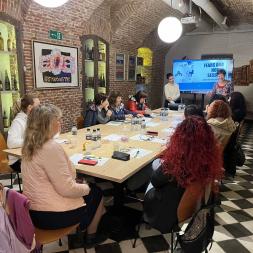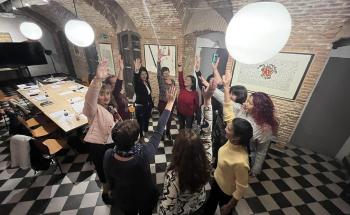
Third-party on-site course
The 21.century student – open-minded, tolerant and active citizen of future Europe
This is a 7-day training course, offering a hands-on, practical training which will empower the participants with the skills and knowledge how to organize relevant training sessions for their students so that they become more open-minded and accepting differences.
This short CPD (Continuing Professional Development) course is eligible for Erasmus+ funding.
02.02.2024
Next upcoming session:
25.11.2024
- 01.12.2024
Multiple locations
Description
Globalization and migration have brought together people from different ethnic origins, religious backgrounds, traditions and languages. We live together and we should not only tolerate this diversity, we should value it as an opportunity through which we can learn from one another in order to build stronger, more dynamic societies. Human rights, diversity, tolerance and non-violence related issues have become even more important considering the migrant crisis and the terrorist attacks round Europe and worldwide.
Schooling could play a key role in overcoming the historically developed negative attitudes to human differences. The realization of this role suggests that teachers have the relevant knowledge, skills and tools.
This 7-day course will empower the participants with the skills and knowledge how to organize relevant training sessions for their students so that they become more open-minded and accepting differences. The training course is the result of 2 Erasmus+ projects, where the partners (with the participation of experts from European Integration & Training Centre Alpha) developed a Teachers’ Manual comprising 66 training topics distributed in 3 modules: Human rights, Diversity and Active citizenship.
The participants in the training course will have free-access to the training topics in the Teachers’ Manual. Each topic is accompanied by several multimedia objects, e.g. animated cartoons, video clips, filmed drama performances and discussions, simulations, case studies as basis for discussions, interactive exercises, etc. Multimedia objects are ready-to-use materials meant to support teachers' work as mediators in the trainings they are expected to deliver after attending the course. The multimedia resources are described with the corresponding characteristics as learning objects in the Teachers' Manual.
After participating in the training course participants will be supported in the practical implementation of the newly acquired skills and competences.
Learning objectives
- Getting the knowledge of basics in Human Rights, Diversity and Involvement education through the topics in the Teachers' Manual.
- Mastering skills which will enable them to discuss with their students questions on existing notions of human differences in modern society and run relevant activities choosing from the ones suggested in the Teachers’ Manual considering the local context.
- Getting to know non-formal education teaching approaches and start using them not only in the suggested civic education trainings but also in the routine teaching process.
- Responsibly accepting a code of behaviour so that all their actions and interactions bear respect to Otherness and students’ individuality by participating in the course training sessions together with a diverse group of European teachers.
- Learn more about the challenges Spanish teachers have faced regarding the use of the Teachers’ Manual through the planned sessions with the involvement of Spanish teachers who have piloted the training topics.
- Learn how to work in international teams through the group and pair activities.
Methodology & assessment
The training course is based on the use of non-formal education methods as an approach for delivering the contents. The general delivery method during the course is simulation of real lessons with students: during the 7-day training sessions there will be almost no lectures and presentations. Participants will, most of the time, step in the shoes of their students whereas the trainers will deliver the contents as suggested in the Teachers’ Manual. This will provide trainees with first-hand experience how to deliver the trainings to their students after attending the course.
The pedagogical methods that we use are based upon experiential training, group and peer activities, learning-by-doing and best practices’ exchange.
Teachers will learn about and participate in implementing a diverse number of non-formal ways for delivering contents in which trainees are active participants, e.g. simulations, role plays, guided drama activities, theatre of the oppressed, interactive video resources, Oxford-style debates, group and pair work, mind-mapping, creating artistic productions – collages, drawings, dances, poems/ prose, etc.
Local Spanish teachers who have previously used the Teachers’ Manual and have delivered the suggested trainings to their students will participate in specialized sessions during which they will talk about their experiences and provide some first-hand tips and support to the course participants. Local visits to the schools could be organized depending on the participants’ needs.
Teachers from primary/secondary schools, trainers, school managers, pedagogical advisers and any other staff of education organizations are eligible to receive an Erasmus+ grant covering all the costs including travel, accommodation and daily subsistence, cultural activities and all fees. The training course is designed to be fully funded by the Erasmus+ Programme.
The pedagogical methods that we use are based upon experiential training, group and peer activities, learning-by-doing and best practices’ exchange.
Teachers will learn about and participate in implementing a diverse number of non-formal ways for delivering contents in which trainees are active participants, e.g. simulations, role plays, guided drama activities, theatre of the oppressed, interactive video resources, Oxford-style debates, group and pair work, mind-mapping, creating artistic productions – collages, drawings, dances, poems/ prose, etc.
Local Spanish teachers who have previously used the Teachers’ Manual and have delivered the suggested trainings to their students will participate in specialized sessions during which they will talk about their experiences and provide some first-hand tips and support to the course participants. Local visits to the schools could be organized depending on the participants’ needs.
Teachers from primary/secondary schools, trainers, school managers, pedagogical advisers and any other staff of education organizations are eligible to receive an Erasmus+ grant covering all the costs including travel, accommodation and daily subsistence, cultural activities and all fees. The training course is designed to be fully funded by the Erasmus+ Programme.
Certification details
At the end of the course, each participant will receive a certificate of attendance and a Europass Mobility Certificate.
We will support the participants in the certification process by delivering a special session devoted to Europass mobility certificates, as well as in the validation of learning outcomes process by providing mentors to all trainees during the implementation process when they will deliver trainings to their students using the Teachers’ Manual topics.
We will provide photos of the training course and a selection of videos that can be used for visibility and dissemination purposes. The Teachers’ Manual and all digital resources will be freely available to all trainees for prospective trainings and re-dissemination among colleagues and students.
Pricing, packages and other information
-
Price:560Euro
-
Package contents:Course
Additional information
-
Language:English
-
Target audience ISCED:Primary education (ISCED 1)Lower secondary education (ISCED 2)Upper secondary education (ISCED 3)
-
Target audience type:TeacherCareers CounsellorSchool Psychologist
-
Learning time:5-10 hours
Upcoming sessions
More courses by this organiser

On-site
Inclusion and active citizenship in the primary school classroom
Next upcoming session
-
Multiple locations
Organisation picture
Organised by
Alpha Centre

On-site
Inclusion and active citizenship in the primary school classroom
Next upcoming session
-
Multiple locations
Organisation picture
Organised by
Alpha Centre

